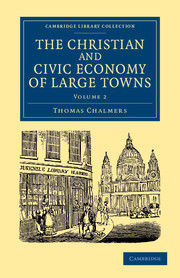Description
The Christian and Civic Economy of Large Towns: Volume 2
Cambridge Library Collection - British and Irish History, 19th Century Series
Author: Chalmers Thomas
This three-volume work (1821–6) outlines the ways in which an urban industrial society can become self-sufficient through Christian communalism.
Language: English
Subject for The Christian and Civic Economy of Large Towns: Volume 2:
Approximative price 40.64 €
In Print (Delivery period: 14 days).
Add to cart
Publication date: 06-2013
Support: Print on demand
Support: Print on demand
Description
/li>Contents
/li>
This three-volume study by the Scottish churchman and social reformer Thomas Chalmers (1780?1847) is a revealing work of Christian morality as applied to urban economic theory. Having moved to Glasgow in 1815, Chalmers was given a free hand in 1819 for an experiment in urban ministry at the new parish of St John's in the poorest district of the city. His reforms improved education and reduced the need for institutional poor relief by dividing the area into manageable 'proportions' that were closely looked after by parish elders and deacons, reviving a traditional community spirit and promoting self-help. Although sometimes severe, Chalmers' system and this influential work reflect Enlightenment optimism regarding human nature, suggesting the need for the Church of Scotland to respond actively to problems of urban industrialisation. Volume 2, published in 1823, investigates the nature of pauperism in Scotland and England and the ways in which Parliament and the parish can work towards its abolition.
9. On the relation that subsists between the Christian and the civic economy of large towns; 10. On the bearing which a right Christian economy has upon pauperism; 11. On the bearing which a right civic economy has upon pauperism; 12. On the present state and future prospects of pauperism in Glasgow; 13. On the difficulties and evils which adhere even to the best condition of Scottish pauperism; 14. On the likeliest means for the abolition of pauperism in England; 15. On the likeliest parliamentary means for the abolition of pauperism in England; 16. On the likeliest parochial means for the abolition of pauperism in England.
© 2024 LAVOISIER S.A.S.




